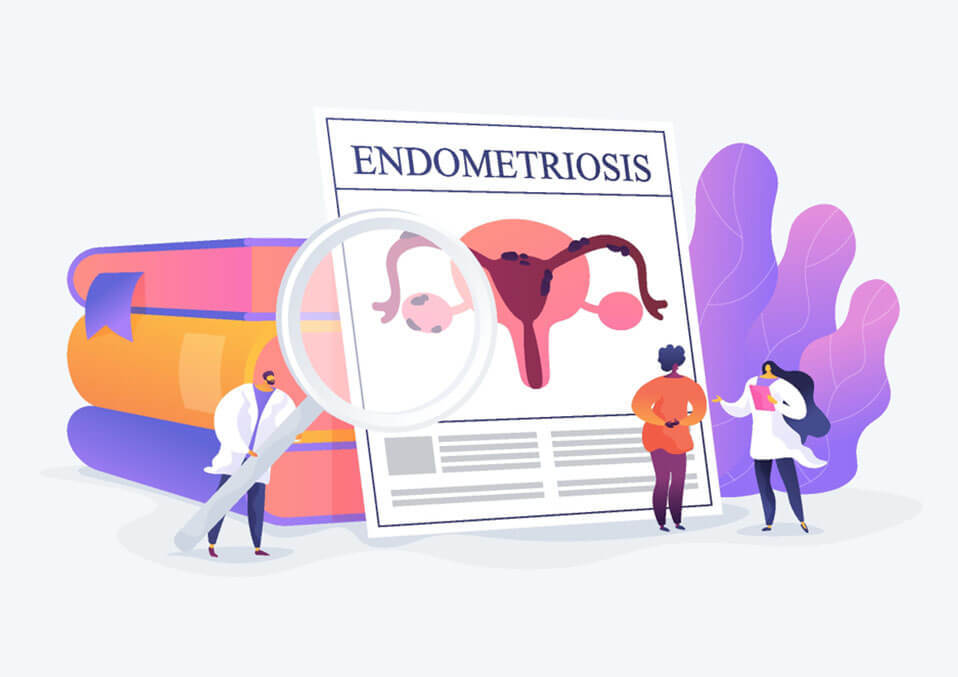What is Endometriosis? What is endometriosis? Here is everything you need to know about endometriosis. Endometriosis, according to experts, is a disease wherein the tissue similar to the tissue that forms the lining of your uterus called the endometrium grows outside of your uterine cavity. Your tissue grows on your ovaries, bowel, and tissues lining your pelvis which is unusual but possible.
Can you get pregnant with endometriosis? Well, the answer is mostly no. Irregular period and endometriosis come together because the hormonal changes in your menstrual cycle can affect your endometrial tissue that causes the area to become painful and irritated. Endometriosis cyst can be a severe one but the tissue that’s trapped in your pelvis can have these endometriosis causes like irritation, scar formation, adhesions, severe pain during your menstruation, and fertility problems.
Endometriosis symptoms
Here are the endometriosis symptoms based on experts but these may vary. Some women may experience mild ones but some can have moderate to severe ones. One of the most common symptoms is pelvic pain and others are:
- Painful periods
- Pain in your lower abdomen before and during periods
- Cramps one or two weeks before your periods
- Heavy menstruation
- Infertility
- Discomfort on your bowel movements
- Painful sexual intercourse
- Endometriosis back pain during periods
Stages of endometriosis

The endometriosis stages are one of the things among everything you need to know about endometriosis. It is known by the endometriosis test and a specific endometriosis treatment is needed for every stage.
Stage 1: Minimal
For the minimal stage, there are only small wounds or lesions that can be found in your organs or in the tissue lining of your pelvis or abdomen. There is also little or no scar tissues.
Stage 2: Mild
The mild stage has more implants than the minimal stage. This stage is also deeper in your tissue and there are some scar tissues.
Stage 3: Moderate
The moderate stage has several deep implants. There may also be small cysts on one or both ovaries and adhesions which are thick bands of scar tissue.
Stage 4: Severe
There are larger cysts on one or both your ovaries as well as thick adhesions. This stage is the most widespread and has a lot of deeper implants.
The endometriosis treatment

One of the things on everything you need to know about endometriosis is the endometriosis treatment. First, doctors and experts usually decide your treatment based on the symptoms of your illness and ask you if you want to get pregnant. Most cases of endometriosis start with pain medication. Some doctors may also give you hormone therapy like birth control pills, progestin therapy, aromatase inhibitors, and gonadotropin-releasing agonists and antagonists. Researches show that hormone therapy can work for infiltrating endometriosis but doctors don’t believe in it.
Meanwhile, you may need to undergo surgery if the treatments don’t help to remove those implants. The surgery can be done by laparoscopy or by abdominal surgery. If you don’t want to get pregnant, the doctor may suggest removing your uterus which is called a hysterectomy. Hysterectomy can go with oophorectomy wherein your ovaries will be removed as well.
A take-out about endometriosis
Well, it is understandable that you want quick and easier relief from the pain and other symptoms of endometriosis. The condition might destroy your life if you leave it untreated. Facing reality, endometriosis has no treatment. However, the symptoms of this illness can be managed. There are medical and surgical choices for you that may help you reduce the symptoms and manage any complications before it gets severe. Your doctor may also try conservative treatments and recommend you to undergo surgery if your condition doesn’t improve.
Some may try an endometriosis diet but each person reacts differently to the treatment choices. Work with your doctor to find the best treatment or management that will work for you. It may be frustrating and stressful to know about endometriosis and fear that there will be no treatment for this. Because of this, it is difficult to handle it alone, emotionally and mentally. So, you need to consider looking and joining a support group as well and learn more about your condition. Don’t be afraid and don’t hesitate because there are a lot of people who will support you!
Read also:
- Healthy and Tasty Patriotic Food Ideas
- Baby Health: Best Essential Oils That Are Safe for Pregnancy
- Experiment Ideas: Fun Ways of Teaching Health Science for Kids
- Healthcare: What are the Alternatives for Glucose Test During Pregnancy


